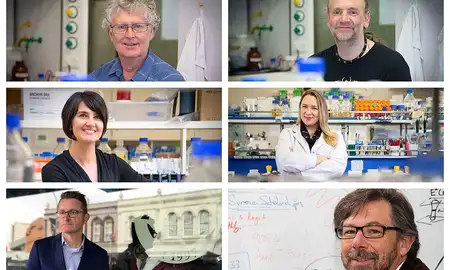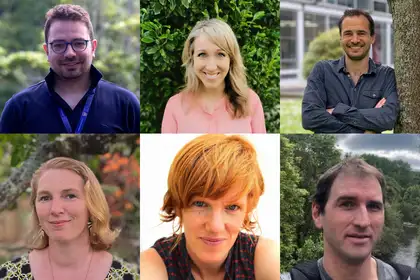
Clockwise from top left: Dr Ruggiero Lovreglio, Dr Elizabeth Parlato, Dr Maxence Plouviez, Dr David Simpson, Dr Alice Beban, Dr Rosie Gibson.
The successful projects look at a wide variety of topics, including sleep practices in Aotearoa New Zealand, menstruation and perimenopause tracking apps, family support for transgender young people in Aotearoa New Zealand, understanding how Māori create, shape, experience and share their worlds, the regulation modes of genes, and the effect of safety training on human memory.
The 13 projects comprise five Fast-Start grants for new and emerging researchers, and eight Standard grants, totalling $8,174,000 of funding, or 10.6 per cent of the total funding pool for 2022. The grants are awarded annually to support three-year research projects in humanities, sciences, social sciences, mathematics, and engineering.
A broad spread of disciplines and subjects were awarded amongst the Massey recipients, reflecting the growing research strength across our disciplines, with six based in science disciplines, five in humanities and social sciences, one in health, and one in creative arts.
Provost Professor Giselle Byrnes says this funding is indicative of Massey’s continued excellence in innovation and the creation of new knowledge through research.
“I am enormously proud of the breadth and quality of research excellence across these 13 successful proposals and warmly congratulate all the research teams involved. Our new university strategy prioritises and recognises research excellence, and it is wonderful to see these ambitions being delivered through this important suite of projects.”
Marsden Fund Council Chair Professor David Bilkey says Te Pūtea Rangahau a Marsden was created to enable leading and early-career researchers to develop their most inspired and ambitious ideas.
“Support for curiosity-driven ‘blue-sky’ ideas is vital sustenance to feed the healthy, resilient, and diverse research culture we have in Aotearoa. The resulting mahi can be expected to challenge accepted ways of thinking, introduce new lines of enquiry, and sometimes lead to unexpected discoveries.”
“The depth and breadth of knowledge represented in this year’s funded research is something to be proud of, with research excellence and scholarly impact in areas such as adapting to the climate crisis, improving hauora health and wellbeing, and advancing fundamental research that underpins new technologies.”
Summaries of the successful Massey projects:
How much do they recall? Measuring the effect of safety training on human memory – Dr Ruggiero Lovreglio, School of Built Environment.
Due to the limitations of human memory, it is important to refresh safety training to ensure that people retain essential knowledge over time. In many countries, there are legal requirements to repeat safety training after a certain period. But the time intervals between training vary greatly, even for the same occupation in different countries, because no one knows how long people retain essential information for. We propose to find out. We will compare three different kinds of safety training with the same learning outcome: practical, theoretical, and virtual reality. We will apply Bayesian statistics to investigate how long knowledge is retained – and understand why some individuals retain knowledge for longer than others.
Dr Zhenan Feng and Dr Daniel Paes are also involved in this project.
Gene flow to the rescue? An analytical framework for estimating impacts of genetic augmentation on wildlife population dynamics – Dr Elizabeth Parlato, School of Natural Sciences.
Is it really possible to genetically rescue wildlife populations? Our project will answer this critical question using an innovative interdisciplinary framework across long-term demographic and genetic datasets for kakaruia (black robin), hihi, kōkako and tūturuatu (shore plover) populations. Aotearoa New Zealand’s history of conservation practice has generated exceptional datasets across a diversity of species, providing a unique opportunity to assess the impacts of genetic augmentation over a range of scenarios. This work will forge new links between population biology and genetics to rigorously test genetic rescue theory and contribute globally to the genetic management of imperilled populations.
Understanding the mechanisms of microalgal self-aggregation for economic and sustainable harvesting – Dr Maxence Plouviez, School of Food and Advanced Technology.
Microalgae provide important functions for food production and wastewater treatment, but the expansion of microalgae biotechnologies is currently limited by our ability to harvest these microorganisms economically and sustainably. Focusing on predation-response in the model microalga Chlamydomonas reinhardtii, this research seeks to determine, for the first time, the molecular pathways and biomolecules involved in microalgae self-aggregation as a predation response. This fundamental research will improve our understanding of microalgal ecology, evolution, and physiology. It will also lay the foundation needed to ultimately develop cost-and resource-efficient harvesting technologies.
Professor Benoit Guieysse is also involved in this project.
Sensationalising Sleep: Discourses and practices of sleep in Aotearoa – Dr Rosemary Gibson, School of Psychology.
Modern society commodifies and commercialises sleep, establishing it as a resource which can be manipulated to achieve waking goals. In response, the market for sleep aids and trackers is burgeoning while media sensationalises ‘harmful’ sleep behaviours, posing paradoxical risks to genuine sleep health. Overt and subtle media messaging has the potential to influence sleep-related beliefs, attitudes, and practices. For this integrative research project, thematic analyses of media texts will be followed by a discourse analysis of exemplar texts and audience responses. Theoretical perspectives will be expanded and developed, challenging conventional models and providing insights to sleep relevant to our diverse and changing society.
Professor Leigh Signal and Associate Professor Mary Breheny are also involved in this project.
Resisting resource grabs: Understanding emotions in environmental conflict in the Mekong River Basin – Dr Alice Beban, School of People, Environment and Planning.
Resource grabs are threatening people and ecologies across the Mekong region, yet deepening authoritarianism is stoking fear amongst civil society groups about the dangers of resistance. Political ecology’s traditional focus on the material dimensions of environmental conflict cannot fully explain how power operates and why people resist. This project breaks new ground by examining the centrality of emotions to projects of state making and resistance across scale. The research will explore how emotions emerge in and inform place-based resource struggles and how they translate across scales in regional collective responses. It will illuminate how emotions facilitate social and ecological change.
Minimal mathematical models for dynamical systems with abrupt events – Dr David Simpson, School of Mathematical and Computational Sciences.
By determining how objects, fluids, organisms, etc, move we can predict their future state. We can then modify our actions or the system itself to our advantage, and in many ways this is the basis of technological advances throughout society. While some understanding can be achieved experimentally, a model is required to quantitatively determine what features cause which phenomena to occur and when. Through modelling we can explain how different dynamics occur under different conditions. This project will explain when and why standard normal forms(standard sets of equations) can be used and how to modify and simplify them when needed. The results will provide a rigorous methodology for determining how the physical features of a system drive its dynamics.
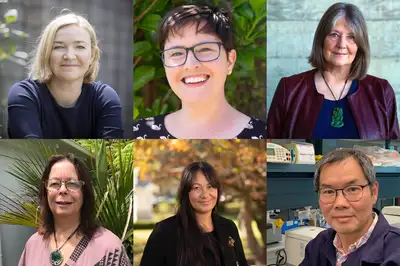
Clockwise from top left: Professor Sarah Riley, Dr Julia de Bres, Professor Christine Kenney, Associate Professor Xue-Xian Zhang, Dr Jani Wilson and Dr Angela Barnes.
The intimate technology shaping millions of lives: Exploring the possibilities of menstruation and perimenopause tracking apps for people with diverse embodied experiences - Professor Sarah Riley, School of Psychology.
Menstrual tracking apps are designed around a prototypical user: a white, affluent, cisgender, heterosexual, able-bodied, young woman, which reinforces narrow, potentially harmful, ideas about “normal” or ideal bodies. It is therefore important to ask: What are the experiences of the many non-prototypical users, whose bodies, identities, or life stages are marginalised by these apps? To understand the experiences of these menstrual tracking app users in Aotearoa New Zealand, we will conduct participatory research with users from three life-stage cohorts: 16- to 18-year-olds, post-natal, and perimenopausal. We will use this knowledge to create a story-driven app that affirms diverse embodied experiences, and to amplify marginalised voices, advance the field of digital health, and envision possibilities for these technologies in the future.
Professor Christine Stephens, Dr Tracy Morison and Associate Professor Natasha Tassell-Matamua are also involved in this project.
It takes a village: Picturing family support for transgender young people in Aotearoa – Dr Julia de Bres, School of Humanities, Media and Creative Communications.
This research explores transgender young people’s experiences of positive family support in Aotearoa and asks what support looks like for young people of diverse cultures. This project will expand the focus from parents to trans youth themselves and their broader family, from monocultural majority to ethnically diverse participants, and from trauma to resilience. Our gender and culturally diverse team will interview twelve transgender young people (three Māori, three Pasifika, three Asian, and three Pākehā) and five each of their most valued supporters. This will be the first discourse-based research to advance knowledge in transgender studies, family studies and language and gender. It will explore how young people and their families challenge oppressive social structures and provide insights for those seeking to be part of the village that raises a transgender child.
Kia whakatōmuri te haere whakamua: Translating Mātauranga Māori, usefully applied in the past, to enhance recovery trajectories in the future – Professor Christine Kenney, Te Āti Awa ki Kāpiti, Ngāti Toarangatira, Ngāi Tahu, School of Psychology.
Aotearoa experiences diverse catastrophes, yet the country’s disaster recovery strategies are under-developed, Eurocentric, and de-contextualised. Historically, Mātauranga Māori-led recovery approaches have proved highly effective. However, formal recovery practices are uninformed by Māori perspectives and may undermine community restoration. This kaupapa Māori research is co-created with Māori partners, framed by Māori narrative theory and draws ideas from disaster and public health sciences to explore the interface of mātauranga Māori and disaster recovery. The findings will invigorate Māori, disaster recovery, and public health initiatives locally, while encouraging similar endeavours by other Indigenous Peoples, and nations with value-based cultures, globally.
Dr Suzanne Phibbs is also involved in this project.
Rangatiratanga and online media: understanding how Māori, create, shape, experience and share our worlds – Dr Angela Barnes, Te Kapotai, Ngāpuhi, SHORE/Whariki Research Centre.
The distinct ways Māori consumers and creators of content engage with online media to shape and create physical and increasingly virtual spaces of safety and resistance can be viewed as acts of sovereignty or rangatiratanga. By exploring virtual rangatiratanga, as forms of Māori agency, this research seeks to understand how, we, as Māori, create, shape, experience and share our virtual worlds. The research involves in-depth qualitative interviews, textual readings of online items and wānanga to extend theory and develop new knowledge. The research is unique as it will bring together two Māori-centred frameworks Kia Manawanui and A Wairua Approach – with both theoretical and practical implications.
Professor Helen Moewaka Barnes is also involved in this project.
Kia rite! Kapahaka for Screens – Dr Jani Wilson, Ngāti Awa, Ngā Puhi, ngā iwi o Mātaatua, School of Music and Creative Media Production.
Through a two-tier approach, beginning with an overview of screened kapahaka performances followed by in depth iwi-based audience study, this project focuses on the various adaptations to kapahaka as a response to technological development. The second trajectory is a kapahaka audience study to inform perspectives on past performances, to assess where the art presently sits, and to consider a BlueSky Map as to where technology might take this significant cultural performance discipline. Outcomes are at least two-fold; for experienced kaihaka and kaitito to bring their plethora of performance and research skills to academic study, and for Māori to consider the future potential of kapahaka.
Use it or lose it: what determines the regulation mode of a given gene? – Associate Professor Xue-Xian Zhang, School of Natural Sciences.
Gene expression in bacteria can be controlled by either an activator or a repressor which binds DNA to turn a gene on or off, respectively. In this project, we propose to determine the functional and evolutionary consequences of activator versus repressor modes of gene regulation in a model plant-associated bacterium, focusing on two well-studied regulatory systems for controlling xylose and histidine utilization. Modern tools of molecular biology and experimental evolution in conjunction with mathematical analysis will be used to determine the evolutionary outcomes of regulators under controlled laboratory conditions. The results will contribute to a predictive theory crucial to understanding the evolutionary consequences of gene regulation modes in natural system and for effective engineering of gene circuits in synthetic biology.
Structural basis of viral wars: Innate immune system attack on viral genomes and the counterattack by viruses – Dr Elena Harjes, School of Natural Sciences.
From the dawn of humanity, war has raged between viruses and human immunity. A key first line of defence is the APOBEC3 family of enzymes, which target specific DNA-sequence motifs to mutate single-stranded viral DNA preventing replication and diseases, such as HIV-AIDS, hepatitis and more. In turn, many viruses contain genes that trick the human host into producing proteins that disable APOBEC3. Through access to advanced cryo-electron microscopy and the Australian Synchrotron and neutron facilities, this project will determine the structural basis of this war, focussing on the battle between one particular member of the APOBEC3 family, APOBEC3G, and its viral attacker VIF from HIV-1 that assembles a “fifth column” of human proteins to disable APOBEC3G. The results will underpin new anti-viral strategies.
Emeritus Professor Geoff Jameson and Associate Professor Vyacheslav Filichev are also involved in this project.
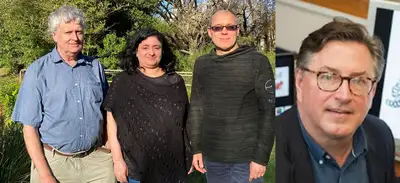
The team collaborating on the viral wars research project (L-R): Emeritus Professor Geoff Jameson, Dr Elena Harjes, Associate Professor Vyacheslav Filichev and Professor Kurt Krause (University of Otago).
A number of academics are also involved in research projects led by other institutions. These include:
- Fish, squid and krill: deep-time evolution of marine tetrapod feeding ecology (Te Papa) - Dr Daniel Thomas.
- Feeling abnormal about normalising Te Reo: Maori wellbeing and intensifying Pākeha consumption of the Maori language (University of Auckland) - Ms Te Rina Krystal Warren.
- "It binds us together": Netball's enduring role in the intergenerational health and wellbeing of Aotearoa women (University of Auckland) - Dr Bevan Erueti.
- He Awe Māpara: The intersections of indigenous imaginings, decolonisation and mainstream sport for Māori, as culturally Māori (University of Auckland) - Mr Luke Rowe.
- A rehabilitation model for professional discipline (Auckland University of Technology) - Dr Marta Rychert.
- Ngā Kare-a-roto: The Ripples Within - Māori Understandings and Expressions of Emotions (Māori and Indigenous Analysis Ltd (MAIA)) - Professor Rangi Mātāmua.
Related news
Pandemic, Pasifika health and asthma research among Massey's Marsden successes
Ten Massey University-led research projects will receive almost $9 million from the Royal Society Te Apārangi annual Marsden Fund announced by Research, Science and Innovation Minister Dr Megan Woods.
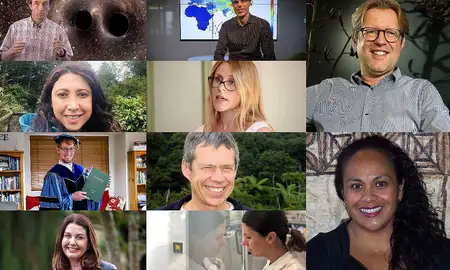
Massey enjoys continued success in Marsden Fund
Thirteen Massey University-led research projects will receive more than $8 million from the Royal Society Te Apārangi annual Marsden Fund announced today by Research, Science and Innovation Minister Dr Megan Woods.
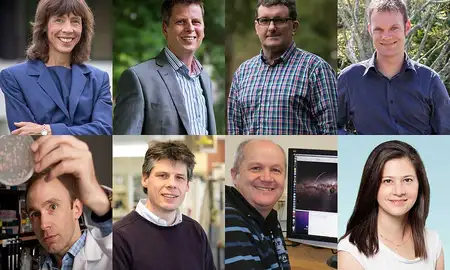
Massey projects receive $7.45m from Marsden Fund
Massey researchers have received more than $7.45 million from the Royal Society Te Apārangi annual Marsden Fund for 15 projects.
